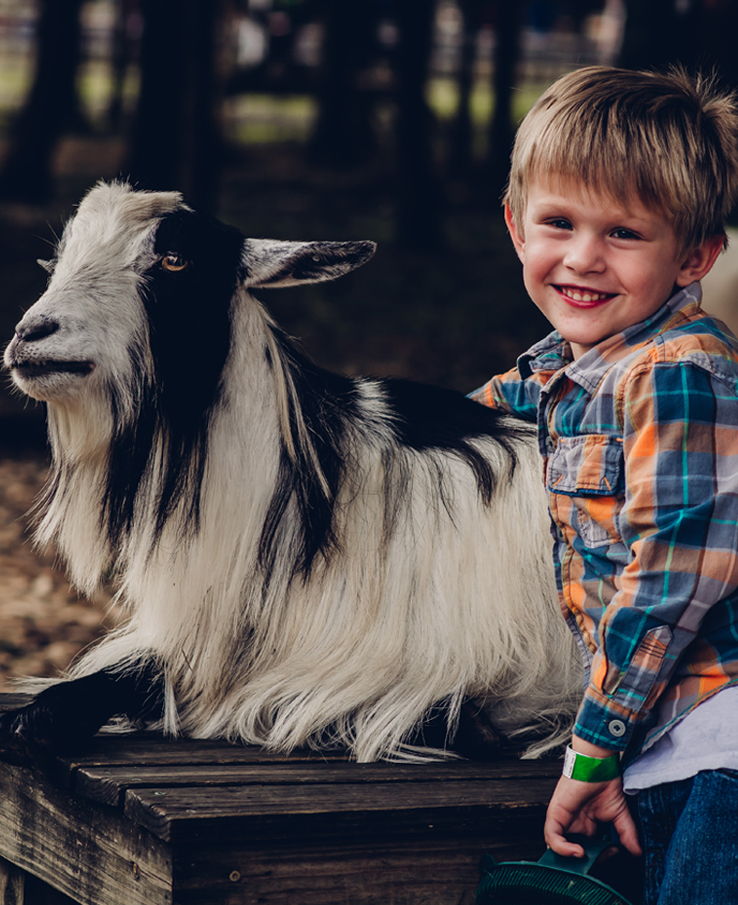"The best petting zoo and animals hands down!"
Petting Farm
Lucky Ladd Farms is home to the largest petting farm attraction of it's kind in Tennessee featuring hundreds of friendly farm animals and exotic livestock. You will learn about a variety of domesticated farm animals and enjoy unique live animal encounters. Our interactive approach is fun for young and young-of-heart alike!
Get up-close and personal to pet, snap selfies, love and hug our sweet animals in Lucky's Barnyard Petting Zoo featuring the friendliest sheep and goats around. In the Lucky's Barnyard area you'll also see cows, llamas, alpacas, horses, donkeys, chickens, turkey, pea-fowl, rabbits and more!
Trips through the Barnyard and to the petting farm are included with admission. However, guests may enhance their experience with purchases of a souvenir cup of animal feed and lettuce treats. Be sure to review our tips below on how to have "Safe Interactions with Animals" and hand-washing.
Optional Add-On Activity Fee: Animal feed is $6 per souvenir cup, with $4 refills. Lettuce treats are $2 each.
To see a full list of animal species found at Lucky Ladd Farms please visit our Zoo & Wildlife page.
Pony Rides
Optional Add-on Activity Fee: $6.00 Per RideLet your little one enjoy this classic recreational entertainment that children have loved for years and helps keep our equine in tip-top shape. Over 20 miniature horses, donkeys, and ponies are proud to call Lucky Ladd Farms their home; and they're eagerly waiting for your doting affection. So let's get saddled up for ride that's sure to be a highlight in your child's day!
Children are safely led around a pony carousel in a fenced enclosure by a trained attendant. Parents may be asked to assist children depending on their size and abilities.
Ride Restrictions
- Riders must be under 4' tall and weigh less than 75-lbs.
- Attraction operates on timed schedule.
- Attraction is weather dependent.
SAFE INTERACTIONS WITH ANIMALS
Healthy animals and bugs may naturally carry diseases that can make you sick. These are known as zoonotic diseases. While this list is not all inclusive, some of the most common zoonotic diseases and their carriers include:
- Lyme disease and Rocky Mountain spotted fever, which you can get from a tick bite.
- West Nile virus, which you can get from a mosquito bite.
- Salmonella infection, which you can get after handling a baby chick, chicken, bird, duck, frog, turtle, or snake.
- E. coli and Lysteria infections, which you can catch if you touch almost any type of living animal, but are most often associated with cows, sheep, and goats.
Thankfully, there are things you can do to help protect yourself, your children, and others from contracting a zoonotic diseases.
- Closely supervise children in animal areas.
- Avoid putting things in your mouth when in or around animal areas.
- No food, drinks, baby bottles, pacifiers, toys, or strollers should be in animal areas.
- Wash your hands for at least 20 seconds after being around animals or animal areas.
- Hand-washing sinks are located at the entrance/exit-ways of Lucky's Barnyard and at nearby restroom facilities. Additionally, hand-sanitizing stations can be located throughout the facility. Hand sanitizer should only be used as a supplement to preventative measures until you can wash with soap and water, as sanitizer does not effectively remove all dirt and debris from hands.
- Properly sanitize any personal belongings such as shoes, strollers and clothing to kill germs that might have been transferred through contact with animals, their bedding, or surroundings.
- Protect yourself from bug bites by using repellent on skin not covered by clothes or shoes.
- Check for ticks after you've been outdoors.
It's important to remember that anyone can become sick from a zoonotic disease, including healthy people. However, some people may be more at risk than others and should take steps to protect themselves or family members. These people are more likely than others to get really sick, and even die from infection with certain diseases. These groups of people include:
- Children younger than 5
- Adults older than 65
- Pregnant women
- People with weakened immune systems

